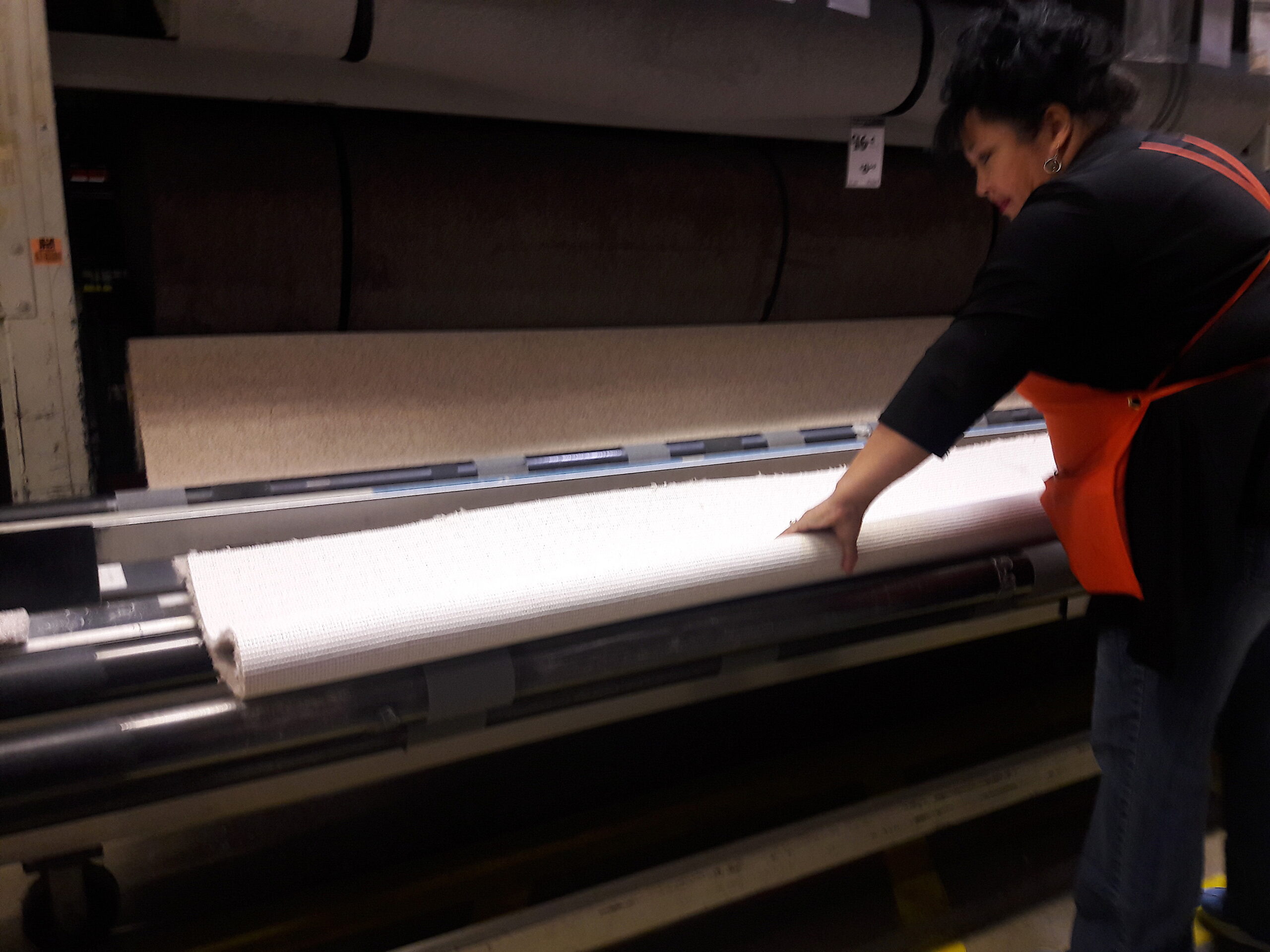Home Depot is the latest workplace being organized. While profits at the home-repair chain have broken records during the pandemic, workers at a store in Philadelphia struggle to afford necessities, Jonah Furman reports.

Home Depot in Markham, Ontario, Canada. (Raysonho @ Open Grid Scheduler / Grid Engine, CC0, Wikimedia Commons)
By Jonah Furman
Labor Notes
 On Sept. 19, workers filed a petition to organize a union among 276 workers at a Home Depot in northeast Philadelphia. If successful, the independent union would be the first at the home repair chain, the fifth-largest private employer in the U.S with 500,000 employees.
On Sept. 19, workers filed a petition to organize a union among 276 workers at a Home Depot in northeast Philadelphia. If successful, the independent union would be the first at the home repair chain, the fifth-largest private employer in the U.S with 500,000 employees.
Vince Quiles, who’s worked at the store for five years, says the union effort gathered over 100 signatures for an election in just five weeks.
At the beginning of the pandemic, Quiles was promoted to supervisor in the plumbing department. Plumbing is the highest-volume section of the store, with around 6,000 sales per day, but the company did little to prepare him. “No training, no staff,” says Quiles. “They said, ‘You’re good with people, go figure it out.’”
Quiles ended up running the department so well that he was eventually offered a promotion to be put on a management track. He turned it down. “If I move up I’m basically just going to be f***ing over the people that I’m cool with, that I go to work with every day, who talk to me about their families,” says Quiles. “And I’m supposed to look these people in the eye when they ask for a raise and say the company can’t afford it.”
Record Earnings

Center aisle of a Home Depot store in 2014. (John Phelan, CC BY-SA 3.0, Wikimedia Commons)
Home Depot can afford it, as Quiles knows. On his break time, Quiles would research the company’s finances, and can recite by heart his own store’s profits. “The store made $30,170,052 in profit last year. Their target was $26,754,634, which left them over their plan by $3,415,418.”
Home Depot, which has 2,317 stores in the U.S., Canada and Mexico, has raked in record-breaking profits during the pandemic, fueled by a surge of homeowners seeking to improve their properties. With demand rising, the company raised its prices. Higher prices drove down transactions among lower-income customers, but higher-income customers more than made up for the loss. “In the second quarter [of 2022], we delivered the highest quarterly sales and earnings in our company’s history,” CEO Ted Decker recently announced.
Quiles began asking why the company couldn’t pay its workers more. Last year, Home Depot made $16 billion in profit. In a meeting with a regional vice president, Quiles questioned why the company couldn’t pay premiums for operating machinery like forklifts, or for translating for Spanish-language customers, or for working in multiple departments. The regional manager touted that the company had spent a billion dollars on employee compensation. “You spent one billion dollars over 500,000 employees,” Quiles remembers saying, “and $15 billion dollars in stock buybacks” — not to mention $7 billion more on investor dividends.
Low Pay, Worker Turnover

Operating the carpet cutting machine at a store in Federal Way, Washington, 2018. (Wonderlane, Flickr, public domain)
Meanwhile, workers at the Home Depot in Philadelphia routinely worry about paying bills, having enough food for both their kids and themselves, or paying rent. The starting wage at the store is around $14.50. The Walmart they share a shopping center with pays more.
All of this has meant workers leaving. With uncompetitive pay, crushing customer volume and little-to-no training, it was hard to retain new employees. One day, Quiles recalls, he ran into a new associate, Aaron, working in the plumbing department. He tried to train him, but kept getting pulled to other assignments or questions. Customers would come up showing pictures of complicated plumbing repairs and asking for solutions, which staff couldn’t answer.
“I can’t tell you how many pictures I would see, like, ‘Bro how do I fix this?’” recalls Quiles. “I would have so many people get mad saying, ‘If you don’t know this, why do you work in the plumbing department?’ I was like, ‘If I knew this shit, I would be a plumber, not making $19.25 an hour as a supervisor.’” Within two months, Aaron, the new associate, making $14.50 an hour, overwhelmed by the volume of the job, and with no meaningful training, had quit.
Inspired by Amazon Union Drive
Having taken his concerns up the corporate chain, Quiles decided change wasn’t going to come voluntarily from management. So, he started doing more research.
Quiles watched the Amazon union drive in Staten Island, and became fascinated with Chris Smalls’ path. It wasn’t dissimilar; Smalls had also been promoted within Amazon, started voicing concerns and complaints, and found himself being stonewalled by management. And the scale of the Amazon Labor Union’s victory in Staten Island gave Quiles hope: “If Chris Smalls could do that at a warehouse of over 8,000 people, we can do it in our store of 300.”
Donate to CN’s 2022 Fall Fund Drive
So, he called the NLRB to learn more about the process, watched interviews with Smalls about how he did it, and started having conversations with people about their jobs. “I would say ‘How do you feel about working here? How do you feel about working conditions and compensation? I’m not part of management.’ They would give me their raw, emotional experience.”
In just five weeks, he and a few co-workers collected over 100 signatures, and submitted them to the Board.
Management’s Response

Home Depot store support center and corporate headquarters in Vinings, Georgia. (Eric W. Kennedy, CC BY-SA 3.0, Wikimedia Commons)
About a month ago, Home Depot management caught wind of the effort. They posted flyers around the store that said, “You Ask, We Listen,” and sent out employee surveys to address concerns. They talked about designating employee-only restrooms, and setting up port-a-potties outside for customers. But they wouldn’t talk about the core issues workers were organizing around.
“You’re talking about an employee bathroom, you’re not talking about why people won’t stay. You can’t go and give a chess player only five pawns and you won’t have a knight, a bishop, or a rook, and say, ‘Go win the game.’”
White-collar management was flown into the store to hold captive-audience meetings and one-on-one conversations with employees about how little a union could do for them. The store manager was switched out overnight. But Quiles thinks the move is backfiring. “Now it’s funny, corporate’s walking around the store and talking to people,” says Quiles, “and they think they’re doing something, but it’s backfiring. People are like ‘Oh, we filed for a union, now you care?’”
Jonah Furman is a staff writer and organizer for Labor Notes.
This article is from Labor Notes. A version of this article was originally published at More Perfect Union.
The views expressed are solely those of the authors and may or may not reflect those of Consortium News.
Donate Today to CN’s
2022 Fall Fund Drive
Donate securely by credit card or check by clicking the red button:

$14:50 per hour, no wonder so few Home Depot employees have any clue about the tools/materials they’re selling.
America has company unions.
America’s unions work closely with the corporations. They brag about doing this. They constantly brag about what great relations they have with the corporate Bosses. For this, they earn 6 figure salaries, and manage big investment funds of 100’s of millions of dollars depending on the union. They have a vested interest in making Wall Street go up.
America’s unions work to separate and divide workers. They never join strikes together. The same union can have two locals fighting for contracts at the same time, and the union will divide the struggles. Of course, the workers have more power when they unite, and having one local go on strike while the other does not, that only helps the Bosses. Surprise. Strike pay is always a joke, despite huge multi-million dollar funds. Surprise.
They announce ‘historic’ deals, but then hide the details of the contract from the workers. Workers today get no updates from bargaining committees. All bargaining is secret and behind closed doors. Then, the actual contract is also secret. The workers are not allowed to see it. Workers are only allowed to see ‘bullet point’ highlights released by the union.
Despite the workers not seeing the contract, a vote is quickly scheduled and rushed as much as possible. Then, on the vote with the contract, its the union officials who count the votes. Often announcing narrow wins for the Bosses while the workers feel there was mass opposition to yet another union sellout deal.
When such a ‘historic deal’ is rejected by angry workers, the company unions do not ask the workers what they want. You do not see union officials talking to workers to see what needs to be in a contract to win approval. Nope. You see the union officials quickly huddle with the corporate Bosses to come up with a new plan. They will jiggle the contract to call it ‘new’, then shove it to a vote again. We’ve even seen unions demand that workers ‘re-vote’ on the already rejected contract. In the end, if need be, the unions will help shove it down the workers throats. As a last resort, Biden and Pelosi will step in to help shove harder backed up by police and military.
These are company unions.
By comparison, a real union is run from the bottom up. Not the top-down style of American ‘labor leaders’. When a real union negotiates, the members are kept updated on the talks. A real union is responsive to the workers and their needs. A real union would fight for safety on the worksite, instead of just sending out condolences when yet another worker dies on the job while Biden and the Democrats look the other way.
I wish these workers well. They are going to need it. But if they organize with any existing American union, ( or ally with them soon after winning a vote), all they’ll end up doing is paying dues to fund a new class of Bosses who sell them out to the Corporate Bosses every time.
Ask railroad workers. Ask an auto worker who’s struggles were so sold out by union officials that corporations were suing each other saying the other corp got a corrupt deal as an advantage. Ask a real worker.
America needs unions. But real unions, that listen to workers and represent workers and fight for workers. The sort that have not been seen in America in several generations. If there was a real union, Joe Biden would have the leaders arrested.
Sad, but true.
While it’s encouraging to see people like this guy and Chris Smalls having some success, and I wish them the best of luck, in the absence of a real union, each of them has to re-invent the wheel, so their impact will be limited.
Hopefully this and similar efforts around the country will be the start of something bigger.
Exactly Norma Ray. Union bureaucracies must be abolished and rank and file committees take their place. The power must reside in the hands of the workers where all negotiating is done on the shop floors, not in backrooms where workers are left in the dark and sold out time and time again. Workers must also be aware of the deception and obfuscation of democratic apparatchiks like Labor Notes and Jacobin. They spend their time reporting about union bureaucrats like Shawn Fain, or the feckless leaders of the Amazon Labor Union who immediately ran to the teamsters President, Sean O’Brien and Sara Nelson of the Flight Attendants union for handouts, thus immediately selling themselves out to the devil, instead of supporting a true rank and file leader like Will Lehman who is running for UAW President to abolish the bureaucracy. He wants the international rank and file to be in control of the means of production and the distribution of the wealth for human need and not the profit motive. No one outside a certain website is willing to talk about his campaign because he is a committed socialist, not a pseudo socialist with the narrow minded nationalist focus of Jacobin and Labor Notes, organizations pushing workers into the trap of the Democratic Party and their lackeys in the union bureaucracies.